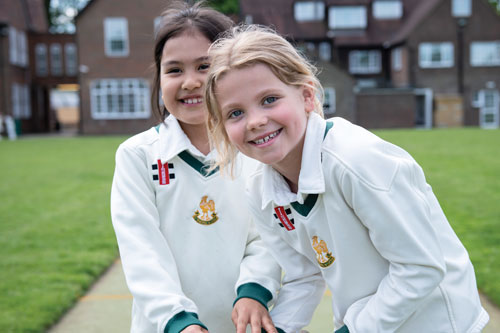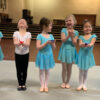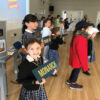
by Katie Atkinson-Hunt
Deputy Head of Sport at Chinthurst School
Sport teaches children life lessons that go far beyond the physical benefits of activity. There is a growing body of research that links physical activity to improvements in educational achievement. This is down to the fact that sport helps children to develop character and learn important social and brain skills such as problem solving, resilience, perseverance, confidence and team work. But these benefits do not just happen; they come from a well devised physical activity programme that is carefully planned and delivered at school. There are certain key principles on which this should be based.
Inclusion and choice are extremely important. A school games programme should enable all children to learn new skills and techniques successfully and to choose the sport they want to play, without restriction. To truly deliver this, children’s choice should not be constrained in any way, least of all by their gender. Our games department facilitates boys and girls training alongside each other in rugby, football, netball and hockey and they play fixtures together in competitive teams. As a result of this approach, the children see themselves as equals on the pitch with no preconceived limitations and the encouragement and support they give one another on the games fields continues off it.
To help children make informed decisions about the team sport they want to play each term, taster sessions should be incorporated into several of the first sports lessons. These tasters showcase the variety of skills each sport develops and help the children to buy-in to their subsequent sports lessons. Choice is empowering. Giving children a voice and some control over their life helps to build self-esteem and confidence, both important attributes which certainly transfer to the classroom, and have an impact on their approach to life generally.
A good sports programme should foster healthy competition and teamwork. So much of what we do in life requires us to work collaboratively and for everyone to play their part no matter what their size, shape, ethnicity, or gender. This is the essence of team sports and playing in a team is empowering. Fixtures and competitions are important ways for the children to showcase their skills and are often their first real taste of competitiveness. Playing matches should not be the preserve of the gifted and talented but instead provide an opportunity for the children to have fun and build new friendships. Every fixture is an important experience for the players. Whether the team wins or loses, the children always gain something from it. They learn to play by the rules and to be the best they can be within the constraints of the game. Teamwork fosters self-belief, collective discipline and rewards hard work. A mistake or loss is often an excellent opportunity to learn and improve. The ability to be resilient and bounce back is really important in life.
Beyond the traditional school sports, there is so much more to games and PE lessons. There are a huge variety of different activities that children can become involved in. The key is to give them an opportunity to try these out. At our school we run a multi-Sport Week annually which is the highlight of the school calendar. Children have the opportunity to take part in many less well-known activities, from Ultimate Frisbee to archery and orienteering to Zumba. Inspirational speakers visit and fun challenges are set for the whole school. ‘Terrific Tuesdays’ and ‘Funky Fridays’ in the last week of each term continue the emphasis on variety giving the children a chance to play games like capture the flag, squares and a range of different dances. Some children go on to pursue these activities further in after-school clubs or outside school. All find it motivating and are excited to do more.
We must not forget that having fun is the most important thing about any successful sports programme. Through sport everyone can experience fantastic moments that they remember forever. There are huge psychological benefits to laughing and smiling so sport should be a positive experience for all the children. It’s a moment for them to be free of the classroom, express themselves in a new way and gain confidence in something that might normally really challenge them.
Within games and PE lessons it is important to create fun and challenging activities which stretch the more able but support the less confident. To achieve this, we now base every lesson around ‘game play’. This involves having a ‘game play’ area and a ‘skill zone’. The skill zone is a small, very structured place where we help develop specific skills or stretch children’s techniques and knowledge. Whilst some children are in a skill zone, the rest are continuing in the game play area, practising playing a game situation and creating rules, superpowers and learning how to play as a team. At the end of the lesson, the children will play a match where we encompass all the skills/game play activities into a real-life match using the exact rules of the specific sport.
Sports days, house competitions and fun swimming galas are great ways to give children the chance to have fun competing alongside different age groups for their house or to represent different groups in the school. They are also brilliant ways to foster community spirit, a sense of identity and feeling of belonging.
Katie Atkinson-Hunt is Deputy Head of Sport at Chinthurst School in Tadworth. The school have been named 2022 Independent School of the Year for Sporting Achievement in recognition of their pioneering sports programme. www.chinthurstschool.co.uk










